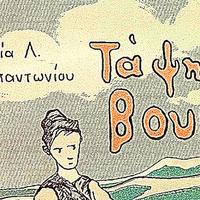29. Ένας δάσκαλος στην κοινότητα
|||Gemeinde
A|teacher||community
|||społeczności
29. Ein Lehrer in der Gemeinde
29. A teacher in the community
29. Un profesor de la comunidad
29. un enseignant dans la communauté
29. Nauczyciel w społeczności
Καλά· του έμαθαν, ας πούμε, την άλφα, τον έμαθαν να συλλαβίζει· μα ύστερα; Κι ο Φάνης κι ο Δήμος νιώθουν πως δε θα μπορέσουν να διαβάσουν το παιδί παραπέρα.
||haben gelernt||||||||sylabieren||später|||||||fühlen|||||||||weiter
Well|him|they learned|let's|let's say|the|alpha|it|they taught||spell out|but then|later|and||Phanis|and||Dimos|feel that|that|not|will|will be able||read||child|further along
||||||||||||||||||Dymos||||||||||dalej
Nun, sie haben ihm, sagen wir, das Alpha beigebracht, sie haben ihm das Buchstabieren beigebracht; aber dann? Und Fanis und Demos haben das Gefühl, dass sie nicht mehr in der Lage sind, das Kind zu lesen.
Well; they taught him, say, the alpha, they taught him to spell; but then? And Fanis and Demos feel that they won't be able to read the child any further.
Πρέπει να το πάρει κάποιος καλύτερος απ' αυτούς.
must|||take it|someone|better|than|them
Jemand Besseres als diese muss es übernehmen.
It has to be taken by someone better than them.
Φτάνοντας στις καλύβες διηγήθηκαν τι είχε γίνει.
Ankommend||Hütten||||
Arriving||huts|narrated|what|had|happened
||szałasy|opowiedzieli|||
Als sie die Hütten erreichten, erzählten sie, was passiert war.
On arriving at the huts they told what had happened.
«Να, ένα τόσο δα μικρό είναι», είπε ο Φάνης.
||so|tiny|small|it is|||Phanis
|||takie|||||
„Sieh mal, so klein ist es“, sagte Fanis.
"Well, it's such a small one," said Fanis.
«Και να δείτε πώς τα κοίταζε τα γράμματα και πώς τα 'παιρνε.»
|||||||||||nahm
||see|how||was looking at||letters||||takes
|||||||||||brał
«Und seht, wie er die Buchstaben ansah und wie er sie 'nahm.»
"And see how he looked at the letters and how he took them."
---
---
Όλα τα παιδιά συγκινήθηκαν μ' αυτή την ιστορία.
|||waren gerührt||||
|||were moved|με|this||story
|||się wzruszyły||||
Alle Kinder waren von dieser Geschichte berührt.
All the children were moved by this story.
Θέλουν να έρχεται ο Λάμπρος εκεί, να τον διαβάζει πότε ο ένας πότε ο άλλος.
||||Lambros||||||||||
They want||comes||Lampros|there|||read|sometimes||one|sometimes||other
||||||||czyta||||||
Sie wollen, dass Lambros dort ist, und dass ihn mal der eine, mal der andere liest.
They want Lambros to come there, to be read by one and then the other.
—Όχι, ένας να τον διαβάζει, είπε ο Αντρέας.
|||||||Andreas
||||reads him|||Andreas
—Nein, einer soll ihn lesen, sagte Andreas.
-"No, one of us should read it," said Andreas.
Ποιος θα είναι αυτός; Στη στιγμή συλλογίστηκαν ποιος ξέρει τα περισσότερα γράμματα και διάλεξαν τον Δημητράκη.
|||er|||überlegten|||||||wählten||Dimitraki
|||||moment|thought||knows||most|letters or knowledge||chose||little Dimitris
||||||się zastanowili|||||||||
Wer wird das sein? Momentan überlegten sie, wer die meisten Buchstaben kennt, und wählten Dimitraki.
Who will that be? In a moment they pondered who knows the most letters and chose Dimitrakis.
Αυτός θα διαβάζει το βλαχόπουλο.
||||Buch
||will read|the|little Vlach
||||błachopoulo
Er wird das Walachenkind lesen.
He'll be reading the dumbass.
Λοιπόν γίνεται στην κοινότητα και σχολείο.
|||Gemeinde||
So it happens|it happens||community||school
Nun findet es in der Gemeinschaft und Schule statt.
Well it is done in the community and school.

